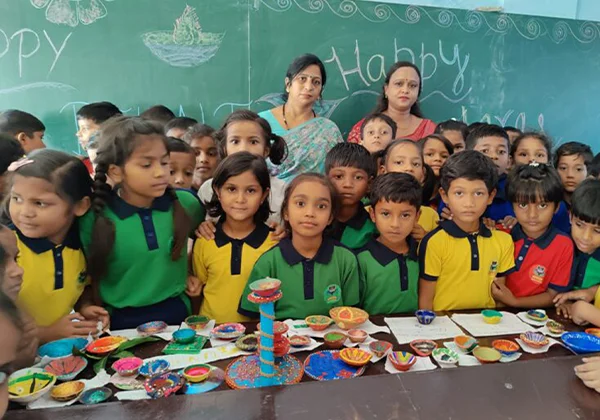Give your child the 𝗚𝗶𝗳𝘁 𝗼𝗳 𝗘𝗱𝘂𝗰𝗮𝘁𝗶𝗼𝗻


Little Star Programme

Little Star Programme
The Little Star Programme at P.N. National Public School is for students from class 1 to 5. This Program for small kids may focus on developing social skills, emotional intelligence, and self-regulation through play-based activities and interactions with other children.Small kids programs may include activities that promote early literacy and numeracy skills, such as reading books, counting games, and letter and number recognition activities.Small kids programs may include opportunities for children to engage in creative and expressive arts, such as painting, drawing, and singing. Programs may provide opportunities for children to explore the natural world and engage in simple science experiments, such as planting seeds, observing insects, or learning about the properties of water.
Benefits for Little Star Programme
Engaging in Little Star Programme can provide numerous benefits for students in classes 1 to 5. P.N. National Public School is the only School in Gorakhpur providing Little Star Programme. These activities, which take place outside of regular academic curriculum, contribute to the holistic development of children. Here are some ways Little Star Programme can help students in this age group:
- Skill Development: Extracurricular activities expose students to a variety of skills beyond academics. They can participate in activities such as music, dance, sports, art, drama, or coding. These activities help develop skills like creativity, critical thinking, problem-solving, teamwork, communication, and time management.
- Physical Fitness: Participation in sports and physical activities helps improve children’s physical fitness and overall health. It promotes an active lifestyle, develops motor skills, coordination, and contributes to their growth and well-being.
- Social Interaction: Extracurricular activities provide opportunities for children to interact with peers who share similar interests. They learn to work as part of a team, make new friends, develop social skills, and build healthy relationships. It helps boost their self-confidence and social confidence.
- Personal Growth: Engaging in extracurricular activities allows students to explore their interests and discover their passions. It helps them develop a sense of identity, build self-esteem, and boosts their sense of accomplishment. Trying new activities and overcoming challenges also fosters resilience and perseverance.
- Time Management: Balancing academics with extracurricular activities teaches students the importance of time management and prioritization. They learn to allocate their time effectively, meet deadlines, and develop a sense of responsibility.
- Enhanced Academic Performance: Research has shown that participation in extracurricular activities can positively impact academic performance. It helps improve focus, concentration, cognitive skills, and memory. Moreover, students often develop a better attitude towards learning and a stronger work ethic.
- Exploration of Interests: Extracurricular activities expose students to a wide range of interests and hobbies. This helps them explore different fields and subjects beyond their academic curriculum, allowing for a more holistic education and potentially igniting long-term passions.
- It’s important to strike a balance between extracurricular activities and academic workload to ensure students have enough time for rest and relaxation. Encouraging children to explore their interests and participate in a variety of activities can have a positive impact on their overall development and happiness.
